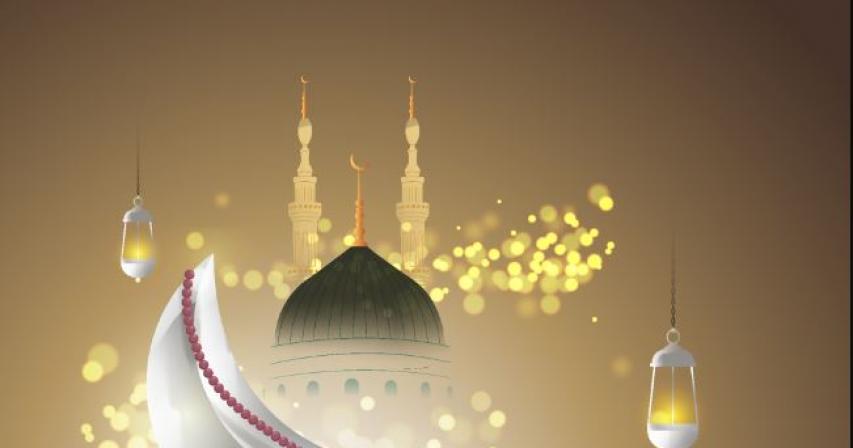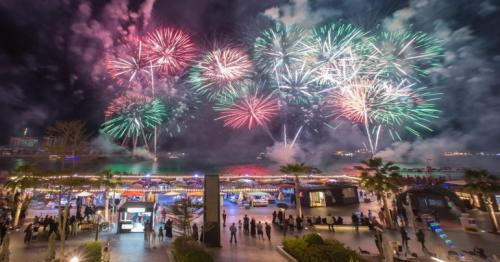Milad-un-Nabi 2023: History and Date of the Prophet Muhammad's Birthday

Milad-un-Nabi, also known as Mawlid al-Nabi, is an important Muslim festival that commemorates the birth of the Prophet Muhammad. It falls on the 12th day of Rabi’ al-awwal, the third month of the Islamic lunar calendar. This festive occasion is celebrated with great enthusiasm and devotion by Muslims around the world. Let's delve into the history, significance, and traditions associated with Milad-un-Nabi.
Also Read:Explore Dubai's Family-Friendly Destinations for 2023
The story behind the festival dates back to the very initial days of Islam. It was a time when Islamic followers used to have religious sessions in the honour of their revered Muhammad. These sessions also included poetries and songs that were sung and recited amid huge public gatherings. In the year 1588, the Ottoman Turks even declared this day as their official holiday and named it Mevlid Kandil.
And it was perhaps owing to this, that the term Mawlid has also been used in various parts of the world such as Egypt, majorly referring to the birthdays of historical and religious figures like Saints and Sufis.
A Historical Perspective
The roots of Milad-un-Nabi celebrations trace back to the early days of Islam. Initially, these observances were conducted privately, with Islamic followers holding religious sessions to honor the Prophet Muhammad. These gatherings often included poetry and songs, recited and sung in front of large audiences. In 1588, the Ottoman Turks formally recognized this day as an official holiday, naming it Mevlid Kandil.
Over time, the term "Mawlid" has been used in various parts of the world, referring not only to the Prophet's birthday but also to the birthdays of other historical and religious figures, such as saints and Sufis.
In the initial days of Islam, the followers of Islam used to observe the celebrations privately. However, after some time, the arrangements began to be held in public. It is said that initially the celebrations were started by a religious scholar of that time Abu ‘I’ Abbas-al Azafi. They were first introduced in the city of Ceuta which is located in Spain.
It was done to strengthen the bonds between the Muslim community as well as to counteract the Christian festivals. It is believed that the origin of Milad un Nabi can be traced back to the 8th century. This was the time when Prophet Muhammad’s house was essentially converted into the house of prayers by Al-Khayzuran who was none other than the mother of Caliph Harun-al-Rashid.
Originally, Milad-un-Nabi was celebrated by the Shia community of the Muslims. However, by the 12th century, even the Sunnis adopted this festival. But there was much resistance from the Sunni community initially. It was not until around the 15th century that Milad un Nabi was widely accepted. And by the 20th century, many regions also declared national holidays on the account of this festival.
The very early celebrations of this festival included a Sufi influence, animal sacrifice as well as torchlight processions. The celebrations used to happen during day time mainly, which is in stark contrast to the modern-day observances.
The Evolution of Milad-un-Nabi
The celebration of Milad-un-Nabi initially started in private gatherings. According to historical accounts, the credit for introducing these public celebrations goes to a religious scholar of the time, Abu ‘I’ Abbas-al Azafi. The first recorded Milad-un-Nabi celebrations took place in the city of Ceuta in Spain.
The primary motivation behind these celebrations was to foster unity within the Muslim community and counteract Christian festivals. The history of Milad-un-Nabi dates back to the 8th century when the mother of Caliph Harun-al-Rashid, Al-Khayzuran, converted Prophet Muhammad's house into a house of prayer. Originally, Milad-un-Nabi was celebrated predominantly by the Shia Muslim community. However, by the 12th century, Sunni Muslims also adopted this festival, albeit with initial resistance. It wasn't until the 15th century that Milad-un-Nabi gained widespread acceptance. In the 20th century, many regions began declaring national holidays to mark this auspicious occasion.
Milad-un-Nabi Traditions
The early celebrations of Milad-un-Nabi featured Sufi influences, animal sacrifices, and torchlight processions, mostly held during daylight hours—a contrast to modern observances. Today, Milad-un-Nabi is celebrated with diverse traditions:
1. Festive Gatherings: Within the Muslim community, Milad-un-Nabi is a day of festivities and joy. People celebrate in various ways, including visiting mosques, distributing sweets, spending time with family, singing, and attending lectures on the life of the Prophet.
2. Sweet Treats: A popular tradition is the distribution of sweets to friends, neighbors, and family. Honey is particularly favored, believed to have been the Prophet's preferred food by many scholars.
3. Mosque Visits: Muslims make it a point to visit the mosque on this day to offer prayers and engage in discussions about Prophet Muhammad's life.
4. Songs of Devotion: The occasion is marked by singing and music within the Muslim community. A widely recognized song is "Maulaud," believed to bring good luck and strengthen the devotee's connection with God.
Major Attractions of Milad-un-Nabi
1. Within the Muslim community: Milad-un-Nabi is celebrated as a day of festivities and fun. However, most people celebrate in a variety of ways such as visiting mosques, distributing sweets, spending quality time with the family, singing, and indulging in arts and lectures.
2. Distribution of Sweets: On Milad-un-Nabi, Muslim people express their happiness by distributing sweets to their neighbours, family, and friends. However, honey is one of the majorly distributed food among the Muslims on this day. This is mainly because of the fact that many scholars used to believe that honey was the favourite food of their prophet.
3. Visiting Mosques: On this day, Muslims don’t miss visiting the mosque at all to offer their prayers. And after participating in the prayers, people generally indulge themselves in discussions pertaining to Muhammad and his life.
4. Singing:The special occasion also witnesses the Muslim community singing in great joy and happiness. Among all the tracks, one of the major and most popular songs is Maulaud. As per the traditional values of Islam, singing this song brings good luck and also reaffirms the loyalty of the devotee towards God.
Famous Food and Clothing for Id-e-Milad/Milad-un-Nabi
Milad-un-Nabi holds a very special place in the Muslim community. On this day, people prepare a variety of delicacies to distribute to their friends and for their own consumption. Some of the most popular sweets are Baklava and Seviyan which are essentially prepared with many other delightfully scrumptious sweets.
This year, Milad-un-Nabi or Eid Milad, which celebrates the birthday of Prophet Muhammad, will be observed on September 26th and 27th, 2023, in the UAE. It's an official holiday in the country.
Public Holiday in the UAE Milad-un-Nabi is a significant public holiday in the UAE. Both private and public sector employees will enjoy a day off on Friday, September 29th, 2023, creating an extended weekend for many.
Milad-un-Nabi Celebration While it's a public holiday, Milad-un-Nabi is more of an observance than a grand celebration. Muslims in the UAE use this occasion to offer prayers, express gratitude to Allah, fast, and recite the Qur'an.
When is Muhammad's Birthday? The celebration, also known as 'Mawlid,' takes place during the month of Rabiulawal, the third month of the Islamic calendar. Shias mark it on the 17th of the month, while Sunnis celebrate on the 12th. However, some branches like Wahhabi and Salafi do not observe Mawlid, leading to variations in holiday observance in different countries.
Due to the Islamic calendar's lunar nature, the Gregorian calendar date of this holiday changes annually. The Islamic calendar is approximately 11 days shorter than the Gregorian calendar, causing occasional double occurrences of the holiday in some years.
Traditions of Muhammad's Birthday Prophet Muhammad (PBUH) was born in Mecca on the 12th of Rabiulawal in the year 570 CE. He was orphaned by the age of 6 and raised by his uncle Abu Talib and grandfather Abdul-Muttalib. Muhammad became known for his trustworthiness as a trader.
At 40, Muhammad received God's message from the angel Gabriel, instructing him to proclaim God's oneness and reject idolatry. Over the next two decades, he shared the Qur'an, laying the foundation for Islam.
Around the world, Muhammad's birthday is marked with religious lectures and Qur'anic recitals in mosques adorned with lights.
While public celebrations of Mawlid didn't start until four centuries after Muhammad's passing, it has a rich history. The oldest known Mawlid text dates back to the 12th century, likely of Persian origin.
Sunni and Shia Islam celebrate Mawlid differently. Shia Muslims believe Muhammad chose Hazrat Ali as his successor on this day, while Sunni Muslims engage in prayers throughout the month without practicing mourning.
In summary, Milad-un-Nabi or Eid Milad is an important occasion in the UAE, where Muslims come together to remember the birth of Prophet Muhammad through prayers and Quranic recitations.
Frequently Asked Questions About Milad-Un-Nabi
1.What is milad un nabi?
A. Eid Milan Un Nabi is an annual celebration to commemorate Prophet Mouhammad's Birth Anniversary.
2.When is milad un nabi 2023?
A. Milad-Un-Nabi 2023 is on 27 September 2023 - 28 September 2023
3.Is Eid Milad un Nabi celebrated worldwide?
A. Yes, Eid Milad un Nabi is celebrated by Muslims around the world, making it a global observance. Different regions may have unique customs and traditions associated with the celebration.
4. How do Muslims prepare for Eid Milad un Nabi?
A. Leading up to Eid Milad un Nabi, Muslims engage in various acts of devotion, including reading the Quran, sending blessings upon the Prophet, and participating in communal gatherings to learn about his life and teachings.
5. Are there any special foods associated with Eid Milad un Nabi?
A. While there are no specific foods exclusive to the celebration, it's common for families and communities to share special meals as a part of the festivities. These meals often include traditional dishes and sweets.
6.Are there charity or acts of kindness associated with Eid Milad un Nabi?
A. Yes, acts of charity and kindness are an integral part of Eid Milad un Nabi. Many Muslims take this opportunity to give to those in need, perform acts of goodwill, and share their blessings with others.
7.How do Sunni and Shia Muslims differ in their observance of Eid Milad un Nabi?
A. Both Sunni and Shia Muslims celebrate Eid Milad un Nabi to honor the Prophet Muhammad's birth. However, specific customs and practices may differ between the two sects, reflecting variations in cultural traditions.
8.Is the date of Eid Milad un Nabi the same every year?
A. No, the date of Eid Milad un Nabi varies each year in the Gregorian calendar because it is based on the Islamic lunar calendar. Muslims determine the date based on the sighting of the moon.
9.What are some common customs during Eid Milad un Nabi celebrations?
A. Common customs include decorating homes and mosques, reciting poetry and hymns about the Prophet's life, and organizing processions or parades to mark the occasion. It's a time of spiritual reflection and community unity.
10.Is Eid Milad un Nabi a public holiday in all Muslim-majority countries?
A. While Eid Milad un Nabi is celebrated widely in Muslim-majority countries, whether it is a public holiday varies from one nation to another. In some countries, it may be observed as a public holiday, while in others, it might be a regular working day.
11.How do Muslims typically greet each other on Eid Milad un Nabi?
A. Muslims often exchange greetings such as "Eid Milad un Nabi Mubarak" or "Mawlid al-Nabi Kareem" to wish each other well on this special occasion. These greetings convey blessings and good wishes for the day.
12.What is the significance of Eid Milad un Nabi?
A. Eid Milad un Nabi, also known as Mawlid al-Nabi, holds great significance for Muslims as Observed as Prophet Muhammad's birthday, Id-e-Milad, also known as Milad-un-Nabi, is celebrated with great enthusiasm in the Muslim community. It is observed in the third month of the Islamic calendar which is known as the Rabi’al-awwal.
PLEASE NOTE : Dates can vary due to cancellation or last-minute changes. it commemorates the birth of the Prophet Muhammad. It's a time for reflection, gratitude, and celebration of the life and teachings of the Prophet.
For more such updates visit our offcial website
By: Vibha Kapoor





Comments